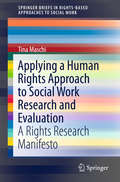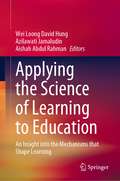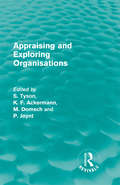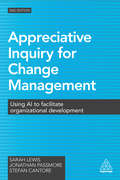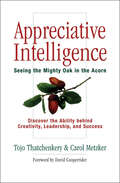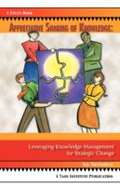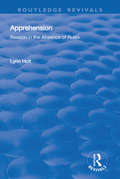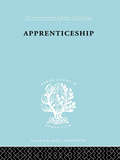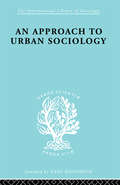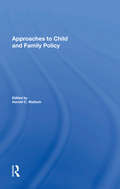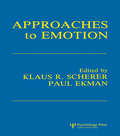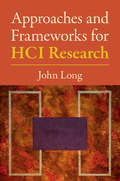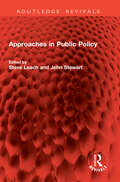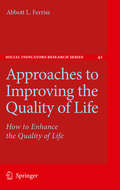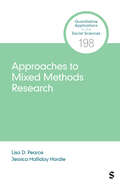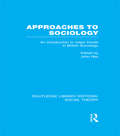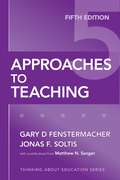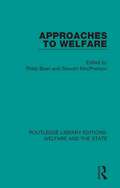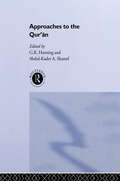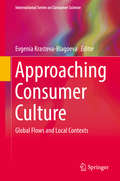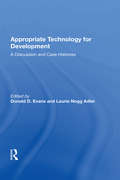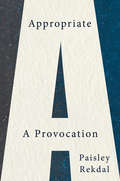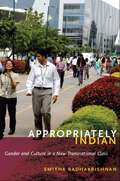- Table View
- List View
Applying a Human Rights Approach to Social Work Research and Evaluation: A Rights Research Manifesto (SpringerBriefs in Rights-Based Approaches to Social Work #0)
by Tina MaschiThis brief introduces a human rights approach to social work research and evaluation, compares it to traditional research approaches, and explains how to apply it in real world social work research. The author draws from a human rights framework that incorporates dignity and respect for all persons, the universality and interrelatedness of rights (political, civil, social, economic, and cultural), nondiscrimination, participation, accountability, and transparency. To advance a human rights approach, it introduces a rights-based model that accentuates the use of mixed methods and participatory research and evaluation. This brief aims to increase competencies in how to apply a rights based approach to research decision-making process from the formulation of research questions, research and practice design, and participatory action strategies that advance human rights. It is a call to action for social workers to forge a rights-based research agenda that fosters empowerment.
Applying the Science of Learning to Education: An Insight into the Mechanisms that Shape Learning
by Azilawati Jamaludin Wei Loong David Hung Aishah Abdul RahmanThis book provides an overview of the various 'Science of Learning' (SoL) research projects led by researchers at the National Institute of Education, Nanyang Technological University, Singapore, and international research collaborators. It presents the goals and rationale behind the Science of Learning in Education (SoLE) initiative and examines a spectrum of topics relevant to bolstering our understanding of the science underlying learning. The Science of Learning (SoL) is an advancing field, with proponents extolling its potential impact on educational practice. This book investigates the possible correlations or causal relationships between brain functioning and development, physiology, environment factors, and their impact on learning. It promotes an interdisciplinary approach to understanding biological to behavioural mechanisms of learning that are oriented toward optimizing and maximizing every learner’s potential.
Appraising and Exploring Organisations (Routledge Revivals)
by S. Tyson K. F. Ackermann M. Domsch P. JoyntFirst published in 1988, this book offers a comprehensive description of the functions and performance of organisational surveys from a wide range of European experts in the field. The book examines the utility of organisational surveys as a method of research for the social sciences and as a support for employee relations strategies and personnel policies. It looks at the broad question of 'what are the key dimensions of an organisation with which managers and researchers should be concerned?' and at how they can be an essential element in a participative management approach to employee relations. Throughout, the book emphasizes the utility of surveys for the study and understanding of organisations.
Appreciative Inquiry for Change Management: Using AI to Facilitate Organizational Development
by Jonathan Passmore Sarah Lewis Stefan CantoreAppreciative Inquiry (AI) is a widely recognised process for engaging people in organizational development and change management. Based on conversational practice, it is a particular way of asking questions, fostering relationships and increasing an organization's capacity for collaboration and change. It focuses on building organizations around what works, rather than trying to fix what doesn't, and acknowledges the contribution of individuals in increasing trust and organizational alignment and effectiveness. Appreciative Inquiry for Change Management studies AI in depth, identifying what makes it work and how to implement it to improve performance within the business. Appreciative Inquiry for Change Management explains the skills, perspectives and approaches needed for successful AI, and demonstrates how a practical conversational approach can be applied to organizational challenges in times of change. Case studies from organizations that have already integrated AI into their change management practice, including Nokia and BP, reveal why the processes are valuable and how to promote, create and generate such conversations in other organizations. Written in jargon-free language, this second edition now includes chapters on how positive psychology can enhance appreciative practice and appreciative coaching, making it an essential resource for anyone looking to implement AI in their organization.
Appreciative Intelligence: Seeing the Mighty Oak in the Acorn
by Tojo Thatchenkery Carol Metzker&“Provocative . . . reveals the ability behind exciting and unexpected innovations, turnarounds, or accomplishments that were once considered impossible.&” —W. Warner Burke, Edward L. Thorndike Professor of Psychology and Education, Teachers College, Columbia University Appreciative Intelligence provides a new answer to what enables successful people to dream up their extraordinary and innovative ideas; why employees, partners, colleagues, investors, and other stakeholders join them on the path to their goals, and how they achieve these goals despite obstacles and challenges. It is not simple optimism. People with appreciative intelligence are realistic and action oriented—they have the ability not just to identify positive potential, but to devise a course of action to take advantage of it. Drawing on their own original research and recent discoveries in psychology and cognitive neuroscience, Thatchenkery and Metzker outline the evidence for appreciative intelligence, detail its specific characteristics, and show how you can develop this skill and use it in your own life and work. They show how the most successful leaders are able to spread appreciative intelligence throughout an organization, and they offer tools and exercises you can use to increase your own level of appreciative intelligence and so become more creative, resilient, successful, and personally fulfilled. &“An inspiring and practical account of how to develop the capacity to see potential within the present and to develop this capacity within oneself and in others.&” —Jane E. Dutton, William Russell Kelly Professor of Business Administration and Professor of Psychology, Stephen M. Ross School of Business, University of Michigan &“A compelling justification for . . . what endows successful leaders with the qualities of persistence, conviction, comfort with uncertainty, and resilience to overcome challenges.&” —Dr. V. Nilakant, coauthor of Change Management
Appreciative Sharing of Knowledge: Leveraging Knowledge Management for Strategic Change
by Tojo ThatchenkeryThis book is dedicated to the development of social constructionist theory and practices for purposes of world benefit. Constructionist theory and practice locate the source of meaning, value and action in communicative relations among people. Chief importance is placed on relational process and its outcomes for the welfare of all. These books are designed for scholars, practitioners, students and the openly curious.
Apprehension: Reason in the Absence of Rules
by Lynn HoltThis title was first published in 2002. This work introduces and explores the role of apprehension in reasoning - setting out the problems, determining the vocabulary, fixing the boundaries and questioning what is often taken for granted. The author argues that a robust conception of rationality must include intellectual virtues which cannot be reduced to a set of rules for reasoners, and argues that the virtue of apprehension, an acquired disposition to see things correctly, is required if rationality is to be defensible. Drawing on an Aristotelian conception of intellectual virtue and examples from the sciences, the author shows why impersonal standards for rationality are misguided, why foundations for knowledge are the last elements to emerge from inquiry not the first, and why intuition is a poor substitute for virtue. By placing the current scene in historical perspective, the author displays the current impasse as the inevitable outcome of the replacement of intellectual virtue with method in the early modern philosophical imagination.
Apprenticeship: An Enquirey into its Adequacy under Modern Conditions (International Library of Sociology)
by Kate LiepmannFirst published in 1998. Routledge is an imprint of Taylor & Francis, an informa company.
Approach Urban Sociol Ils 168 (International Library of Sociology)
by P.H. MannFirst Published in 1998. Routledge is an imprint of Taylor & Francis, an informa company.
Approaches To Child And Family Policy
by Harold C. WallachThis unusual and stimulating collection of essays examines the state of child and family policy in the United States today. Drawing upon the diverse disciplines of the social and behavioral sciences, history, philosophy, and law, the authors assess the influence of federal policy on families; reasons for the failures in national child-care legislat
Approaches To Emotion
by Paul Ekman Klaus R. SchererThis sourcebook is intended as a reader in the fullest sense of that word: a work that offers researchers and students alike the opportunity to examine the many different aspects and widely divergent approaches to the study of emotion. The contributors include samples of biological, ontogenetic, ethological, psychological, sociological, and anthropological approaches.
Approaches and Frameworks for HCI Research
by John LongThis research textbook, designed for young Human-Computer Interaction (HCI) researchers beginning their careers, surveys the research models and methods in use today and offers a general framework to bring together the disparate concepts. HCI spans many disciplines and professions, including information science, applied psychology, computer science, informatics, software engineering and social science making it difficult for newcomers to get a good overview of the field and the available approaches. The book's rigorous 'approach-and-framework' response is to the challenge of retaining growth and diversification in HCI research by building up a general framework from approaches for Innovation, Art, Craft, Applied, Science and Engineering. This general framework is compared with other HCI frameworks and theories for completeness and coherence, all within a historical perspective of dissemination success. Readers can use this as a model to design and assess their own research frameworks and theories against those reported in the literature.
Approaches in Public Policy (Routledge Revivals)
by John Stewart Steve LeachFirst published in 1982, Approaches in Public Policy is an integrated, purpose-written text on the context, process, and practice of policymaking in the public sector, particularly at the local level. It has two main purposes. It aims to provide a stimulating and critical evaluation of trends in the analysis and formulation of policy by examining the realities behind such influential concepts and ideas as ‘rationality’, ‘information systems’, ‘distributional impact of services’ and ‘monitoring’. At the same time, it attempts through case study illustration to provide perceptive and detailed insights into the way such approaches have worked out in practice in a range of examples of policy initiatives in area management, regional planning, health care planning and Comprehensive Community Programmes.The book fills a significant gap in the literature by providing a well-structured set of papers which link theoretical arguments to an evaluation of topical examples of the policy process in action. It will be of interest to students and researchers of public administration, public policy making, planning, and similar topics.
Approaches to Improving the Quality of Life: How to Enhance the Quality of Life (Social Indicators Research Series #42)
by Abbott L. FerrissAfter measuring the Quality of Life and identifying the deficiences in your community, what steps should you take to improve the Quality of Life? This volume reviews methods for improving the Quality of Life that are based upon improving each of the ten domains of the Quality of Life. Steps to improve health, means of reducing environmental toxins, orientation to bring about better self-concept and mental health, and so forth. In each such area, steps are set forth for eliminating undesirable and debilitating features of the domain. Social change comes about by the application of devised steps. The process has been called "telesis". It is the application of intelligent, well-tested interventions to bring about improvement. In some cases it may effect change quickly and others may require a continuing process of adjustment and change. As a handbook for community workers, the volume provides a framework for intervention that could lead to a better tomorrow.
Approaches to Language, Culture, and Cognition
by Masataka Yamaguchi Dennis Tay Benjamin BlountApproaches to Language, Culture and Cognition aims to bring cognitive linguistics and linguistic anthropology closer together, calling for further investigations of language and culture from cognitively-informed perspectives against the backdrop of the current trend of linguistic anthropology.
Approaches to Mixed Methods Research (Quantitative Applications in the Social Sciences)
by Lisa D. Pearce Jessica Halliday HardieApproaches to Mixed Methods Research focuses on the choices social scientists make when designing a study that mixes quantitative and qualitative data. Authors Lisa D. Pearce and Jessica Halliday Hardie explore ways to weave together strands of research using qualitative and quantitative data to speak to and enhance each other; a strand being a series of steps involved in collecting and analyzing a single type of data. The result, they show, is a more holistic body of evidence that emerges, and they illustrate this with examples from a wide range of studies from the United States and other countries.
Approaches to Mixed Methods Research (Quantitative Applications in the Social Sciences)
by Lisa D. Pearce Jessica Halliday HardieApproaches to Mixed Methods Research focuses on the choices social scientists make when designing a study that mixes quantitative and qualitative data. Authors Lisa D. Pearce and Jessica Halliday Hardie explore ways to weave together strands of research using qualitative and quantitative data to speak to and enhance each other; a strand being a series of steps involved in collecting and analyzing a single type of data. The result, they show, is a more holistic body of evidence that emerges, and they illustrate this with examples from a wide range of studies from the United States and other countries.
Approaches to Sociology: An Introduction to Major Trends in British Sociology (Routledge Library Editions: Social Theory)
by John RexThese essays, commissioned by John Rex, reflect the state of sociology in Britain today. Leading representatives of the diverse ‘schools’ provide lucid accounts of their own particular approaches to this complex discipline and in doing so demonstrate the techniques described. Topics covered include the empirical study of stratification, social evolution, survey techniques, mathematical sociology, systems theory, phenomenological approaches, Weberian sociology, structuralism, contemporary Marxism, and the development of theory after Talcott Parsons.
Approaches to Teaching (5th edition)
by Jonas F. Soltis Gary D. Fenstermacher Matthew N. SangerThis popular text continues using the format of the three approaches--The Executive, The Facilitator, and The Liberationist. For the Fifth Edition, the authors add four new case studies: "Scripted Teaching," "Accountability and Merit," "What is the Value of Caring Relationships?" and "School Funding. " Using these and other realistic case studies, they explore the strengths and weaknesses of each approach so that teachers can critically assess their own philosophical positions on teaching. Teachers are urged to ask themselves such questions as: What is the main goal of teaching? What is the most important purpose of education? What do I expect my students to eventually become? Is the way I structure my teaching influenced by how I view my role and goals? This updated edition also adds a new section called "Topics and Resources" to encourage further inquiry into teaching
Approaches to Welfare (Routledge Library Editions: Welfare and the State #1)
by Philip Bean Stewart MacphersonOriginally published in 1983 Approaches to Welfare provides a unique introduction to the study of social welfare in Britain. The contributions, by distinguished figures in the field of social welfare and social policy, explore all the dimensions of the study of social welfare demonstrating that not only have social policies changed in the forty years since the establishment of the welfare state, but so too have approaches to their analysis. The contributors consider these changes in relation to a wide range of social welfare issues, illuminating the diversity and variety within the contemporary study of social policy.
Approaches to the Qur'an (SOAS/Routledge Studies on the Middle East)
by G. R. Hawting Abdul-Kader A. ShareefIn recent years, the study of the Qur'an and its interpretation has expanded to incorporate insights gained from historical, biblical, literary and critical studies. A variety of approaches to the Qur'an and the Muslim exegetical tradition are currently available. Approaches to the Qur'an consists of thirteen essays by leading scholars, both Muslim and non-Muslim, in the fields of qur'anic studies and Islamic studies. Taken together, they offer a sample of the aims, methods and topics of enquiry now being pursued. Each study has a full critical apparatus, and the book includes a consolidated bibliography which will be of great value to students and specialists.
Approaching Consumer Culture
by Evgenia Krasteva-BlagoevaThis fascinating collection analyzes the impact of Western consumer culture on local cultures and consumption in Southeast Europe and East Asia. Cultural, historical, economic and sociopolitical contexts are examined regarding buying behaviors, usage and customization practices and consumer activism, specifically in Bulgaria, Serbia, and Romania as cultures continue to evolve in the post-socialist era, and in China and Japan as a continuation of movements toward modernity and progress. Surprising and thought-provoking contrasts stand out as consumers balance the global with the local in terms of clothing, technology, luxury items, and food. All chapters feature a wealth of empirical and cross-cultural data, and the presentation is framed by Professor Mike Featherstone’s theoretical essay on the origins of consumer culture and the consequences of two hundred years of increasing consumption for the human condition and the future of the planet.Included in the coverage:“You are a socialist child like me”: Goods and Identity in BulgariaConsumer Culture from Socialist Yugoslavia to Post-Socialist Serbia: Movements and MomentsPreserves Exiting Socialism: Authenticity, Anti-Standardization, and Middle-Class Consumption in Post-Socialist RomaniaModernization and the Department Store in Early 20th-Century Japan: Modern Girl and New Consumer Culture LifestylesA Cultural Reading of Conspicuous Consumption in ChinaApproaching Consumer Culture broadens the cultural anthropology literature and will be welcomed by Western and Eastern scholars and researchers alike. Its depth and accessibility make it useful to university courses in cultural anthropology, cultural studies, and sociology.
Appropriate Technology For Development: A Discussion And Case Histories (Westview Special Studies In Social, Political, And Economic Development)
by Donald D. EvansThis analysis of appropriate technology first explores the concept of development in terms of needs, characteristics, and theories and then examines the pivotal role of technology in the developmental process. The twenty contemporary case histories illustrate specific instances of applied technology, not necessarily as examples of successful applic
Appropriate: A Provocation
by Paisley RekdalA timely, nuanced work that dissects the thorny debate around cultural appropriation and the literary imagination. How do we properly define cultural appropriation, and is it always wrong? If we can write in the voice of another, should we? And if so, what questions do we need to consider first? In Appropriate, creative writing professor Paisley Rekdal addresses a young writer to delineate how the idea of cultural appropriation has evolved—and perhaps calcified—in our political climate. What follows is a penetrating exploration of fluctuating literary power and authorial privilege, about whiteness and what we really mean by the term empathy, that examines writers from William Styron to Peter Ho Davies to Jeanine Cummins. Lucid, reflective, and astute, Appropriate presents a generous new framework for one of the most controversial subjects in contemporary literature.
Appropriately Indian: Gender and Culture in a New Transnational Class
by Smitha RadhakrishnanAppropriately Indian is an ethnographic analysis of the class of information technology professionals at the symbolic helm of globalizing India. Comprising a small but prestigious segment of India's labor force, these transnational knowledge workers dominate the country's economic and cultural scene, as do their notions of what it means to be Indian. Drawing on the stories of Indian professionals in Mumbai, Bangalore, Silicon Valley, and South Africa, Smitha Radhakrishnan explains how these high-tech workers create a "global Indianness" by transforming the diversity of Indian cultural practices into a generic, mobile set of "Indian" norms. Female information technology professionals are particularly influential. By reconfiguring notions of respectable femininity and the "good" Indian family, they are reshaping ideas about what it means to be Indian. Radhakrishnan explains how this transnational class creates an Indian culture that is self-consciously distinct from Western culture, yet compatible with Western cosmopolitan lifestyles. She describes the material and symbolic privileges that accrue to India's high-tech workers, who often claim ordinary middle-class backgrounds, but are overwhelmingly urban and upper caste. They are also distinctly apolitical and individualistic. Members of this elite class practice a decontextualized version of Hinduism, and they absorb the ideas and values that circulate through both Indian and non-Indian multinational corporations. Ultimately, though, global Indianness is rooted and configured in the gendered sphere of home and family.
